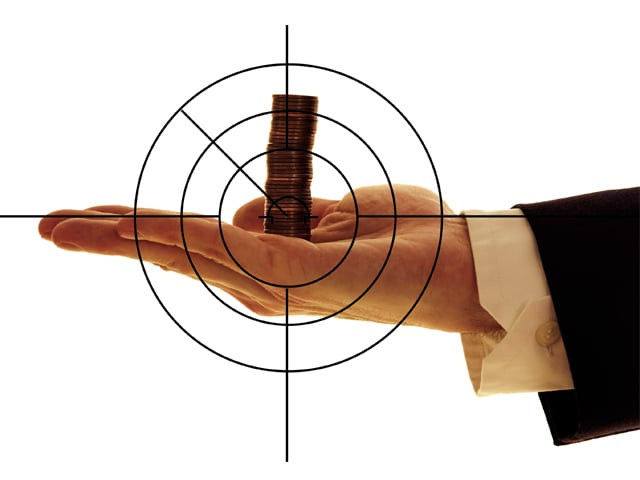Revenue collection: Govt eyes taxing corporate sector assets, earnings
Government implementing new taxes to cover deficit.

Previously, it had hoped to implement a one-time income tax surcharge and a one per cent increase in special excise duty. Both measures were to be tabled in the parliament as part of the reformed general sales tax (RGST) bill but the postponement of this legislation had eliminated the possibility of increasing the quantum of revenues via these sources during the current year.
“The measures would have added between Rs35 and Rs45 billion to revenue collection,” commented an official of the Federal Bureau of Revenue (FBR). Although government officials are tightlipped on the possibility of new taxes, the growing gap between revenue targets and actual collections seems to be making the accelerated introduction of tax reforms inevitable.
After the first review of the current stand-by agreement with Pakistan, the International Monetary Fund (IMF) had mentioned some alternative measures that could be implemented to increase revenue collection. These included a carbon tax, gross asset tax and wealth tax.
According to an FBR official who requested anonymity, the government is considering all options, including a one-time wealth tax surcharge. This surcharge would be a one-off deduction against income, over and above the usual income tax rate.
There has been no headway in the demands to impose tax on farm incomes and attempts at broadening the sales tax net have already faced stiff resistance not just in public forums but also at the legislative level, quickening the pace of imposition of taxes on corporate sector. “The finance ministry has been advised against the imposition of any new taxes, including gross asset tax or any new sales tax,” said member Tax Reform Coordination Group (TRCG) Shabbar Zaidi.
He added that a recent meeting held between the TRCG and finance ministry officials had urged the government to strengthen the administrative apparatus of the tax collection network.
“The establishment of a fiscal policy board to be headed by the federal finance minister will help improve the tax collection mechanism,” he explained.
“The committee has advised the government to reconcile taxpayer records with the National Database and Registration Authority records and to take action against the misuse of Afghan transit trade and initiate steps to curb under-invoicing of imports.”
The tax reform group was formed to help suggest changes to the current taxation regime in addition to assessing the possibilities of expanding the tax net and revenue collection.
Meanwhile, tasked with a revenue target of Rs1,604 billion this year, the FBR faces an unenviable task of increasing domestic revenue collection.
Gross asset tax is not new to the country. The tax was last imposed in 1991 “as a one-off levy payable by a company, as defined in the Companies Ordinance of 1984, on the value of its ‘fixed’ assets as per the balance sheet figure,” explains a report released by InvestCap Securities on Wednesday.
At the time, the tax was split into slabs – zero-rated for companies whose gross assets totaled under Rs50 million, while the highest rate of 0.8 per cent applied to companies with gross assets in excess of Rs250 million.
“If similar tax rates are imposed as those implemented in 1991, corporate earnings will be cut by 27 per cent,” asserted analyst Khurram Shehzad. He pointed out that although the corporate sector is not likely to welcome such a move lying down, the measure is likely to evoke less opposition than a broader tax such as the RGST.
Corporate earnings are expected to grow 18 per cent in the current fiscal year – the highest increase witnessed over the past five years.
Published in The Express Tribune, January 13th, 2011.



















COMMENTS
Comments are moderated and generally will be posted if they are on-topic and not abusive.
For more information, please see our Comments FAQ